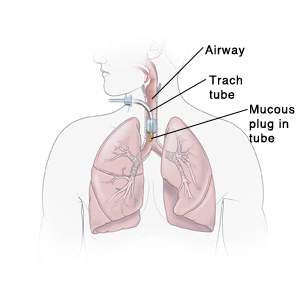You have a tracheostomy (trach) tube that allows you to breathe. Mucus from your airway can collect inside the trach tube and block it. The buildup of thick mucus is called a mucous plug. It’s important that you take steps to prevent a mucous plug from blocking your trach tube. Below are directions for helping keep your trach tube free of mucous buildup so that you can breathe without difficulty.
Home care
Follow these guidelines when caring for yourself at home:
-
Unless your doctor has put you on a fluid-restricted diet, make sure you are drinking plenty of fluids. This means 6 to 8 glasses a day.
-
Keep your airway clear by coughing throughout the day.
-
Suction your trach tube as advised to by your doctor. Do this as often as your doctor suggests.
-
Moisten the air that you breathe as directed by your doctor. You can use a humidifier, particularly in the room you sleep in at night. This is especially important when it's hot and dry out, or when it's cold and you have the heat on.
-
Carry an extra trach tube with you in case one tube gets blocked.
Follow-up care
Follow up with your doctor, or as advised.
Call 911
Call
-
You have shortness of breath, trouble breathing, or wheezing that doesn't get better with suctioning or breathing treatments.
-
You have a blocked trach tube that you can't clear with suctioning.
-
The trach tube falls out and you can't put one back in.
When to get medical advice
Contact your doctor right away if you have:
-
A fever of 100.4°F (38°C) or higher, or as directed by your doctor.
-
Severe, prolonged coughing spells.
-
Red, painful, or bleeding stoma.
-
Swelling of the skin around the stoma.
-
Coughing up yellow, smelly, bloody, or thick mucus.
-
A change in the color of your mucus.
-
Sweaty, clammy skin.


